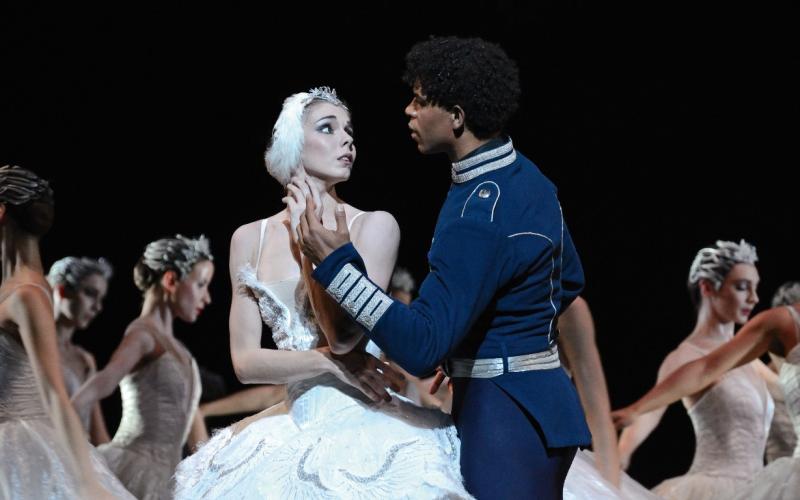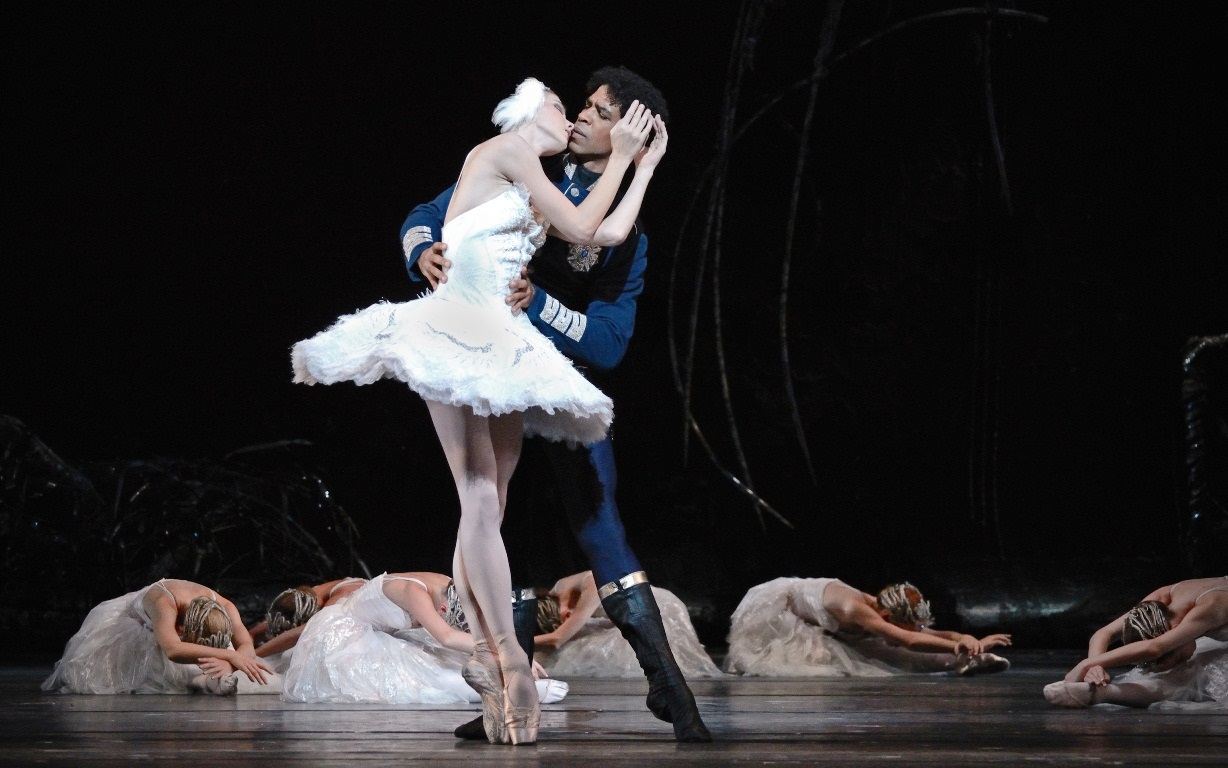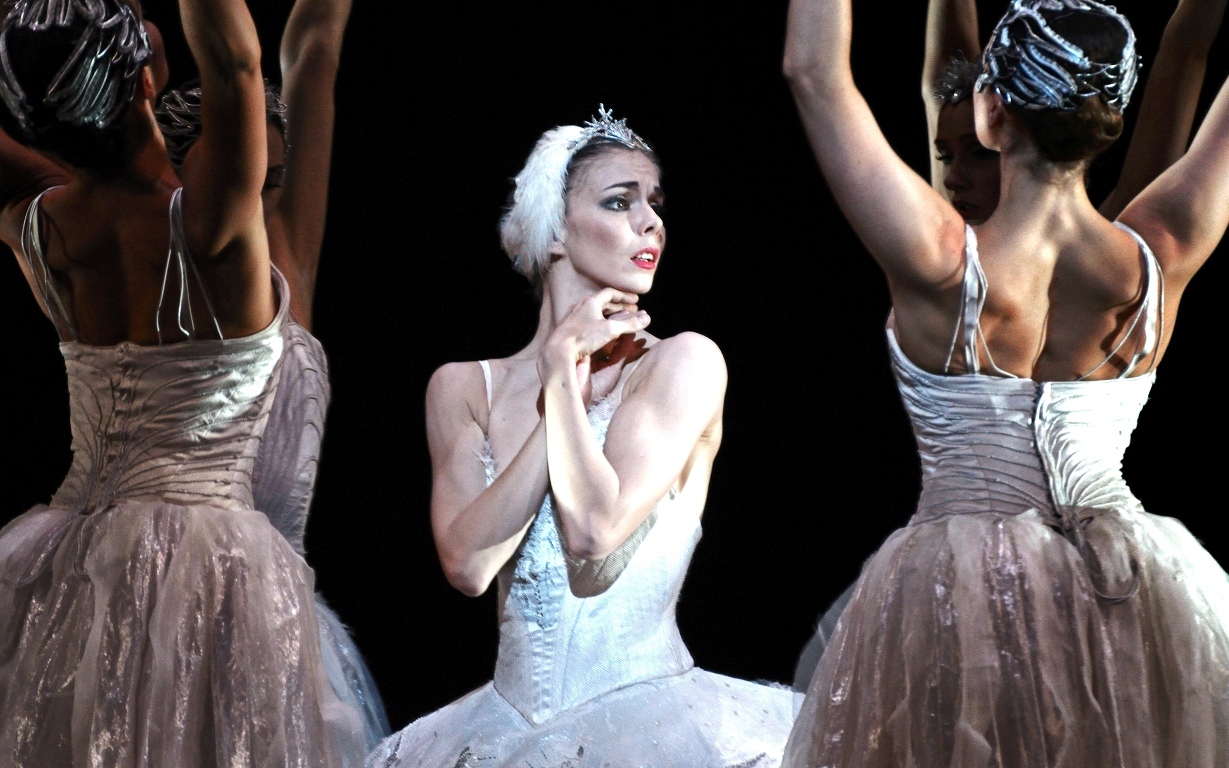Swan Lake, Royal Ballet | reviews, news & interviews
Swan Lake, Royal Ballet
Swan Lake, Royal Ballet
Ex-Bolshoi prodigy Natalia Osipova makes her much-anticipated Royal Ballet debut

The Royal Ballet’s autumn season began on Monday, but this was the eagerly awaited Swan Lake. Natalia Osipova, ex-Bolshoi, now principal with American Ballet Theater and the Mikhailovsky in St Petersburg, was making her debut as a guest with the Royal Ballet, partnered by Carlos Acosta.
Osipova had, dramatically, left the Bolshoi for the smaller and less prestigious Mikhailovsky, to the puzzlement of many. But the Bolshoi streams its dancers: a certain type is classical, another is romantic, another – Osipova’s type – play soubrettes. Her Kitri in Don Quixote (first seen in London in 2007) propelled her into the starriest leagues, but at the Bolshoi that didn’t necessarily mean she had a crack at any role she chose. At ABT she has been dancing Giselle, Romeo and Juliet and Sleeping Beauty; now on to Swan Lake.
 The Royal’s production of Swan Lake, produced by Anthony Dowell nearly a quarter of a century ago, is looking more than its age. It has become a pantomime dame of ballets, its two court acts filled with sound, and fury, and signifying nothing. The two white acts, despite Yolanda Sonnabend’s tragic muse swan costumes, continues serenely pure, especially Act IV, with its music restored under the direction of Tchaikovsky scholar Roland John Wiley.
The Royal’s production of Swan Lake, produced by Anthony Dowell nearly a quarter of a century ago, is looking more than its age. It has become a pantomime dame of ballets, its two court acts filled with sound, and fury, and signifying nothing. The two white acts, despite Yolanda Sonnabend’s tragic muse swan costumes, continues serenely pure, especially Act IV, with its music restored under the direction of Tchaikovsky scholar Roland John Wiley.
But to the star, which was all anyone was interested in this evening. Osipova is now 26, and she is growing in stature with every role. Tragedy is not yet in her bones – her charmingly uptilted nose, gamine stature and rounded features fight her every step of the way – but she has learnt to use her plush, lush, deep bends to convey sorrow as well as sensuality. In Act II, the “white swan” act, she is still feeling her way. The great white pas de deux is not yet a coherent whole – there are good moments, and then moments when her laser-focus fades somewhat. But the good is very good indeed, and her attention to detail and depth of emotional involvement is tremendous.
 Act III, the “black swan” Odile, is more natural territory, with its ferocious technical demands, which Osipova met with almost insolent ease – pirouettes were substituted for half the fouettés, as though it were a mere bagatelle. Occasionally the interpretation tipped over from as yet undeveloped to excessively broad – the moment that, as Odile, she parodied a droopy Odette was an unattractive invention that one hopes will never reappear.
Act III, the “black swan” Odile, is more natural territory, with its ferocious technical demands, which Osipova met with almost insolent ease – pirouettes were substituted for half the fouettés, as though it were a mere bagatelle. Occasionally the interpretation tipped over from as yet undeveloped to excessively broad – the moment that, as Odile, she parodied a droopy Odette was an unattractive invention that one hopes will never reappear.
But it will be the small details that linger – the floating bourrées with which she ended Act II, the moment of emotional release when she leant back against her prince before, her swan maidens catching her eye, she pulled away, a dutiful princess once more.
Carlos Acosta, a fine partner, looked a tad dutiful himself, rarely seeming to become emotionally invested, although Osipova’s fouettés did seem to spur him to match her turn for turn. Otherwise, it is hard for anyone to make much of a mark on this hodgepodge. Hikaru Kobayashi found the right Degas-like shapes for the Act I pas de trois, and Dawid Trzensimiech showed his beautiful carriage and stylish feet.
The evening, however, was Osipova’s. Deservedly.
rating
Share this article
The future of Arts Journalism
You can stop theartsdesk.com closing!
We urgently need financing to survive. Our fundraising drive has thus far raised £49,000 but we need to reach £100,000 or we will be forced to close. Please contribute here: https://gofund.me/c3f6033d
And if you can forward this information to anyone who might assist, we’d be grateful.

Subscribe to theartsdesk.com
Thank you for continuing to read our work on theartsdesk.com. For unlimited access to every article in its entirety, including our archive of more than 15,000 pieces, we're asking for £5 per month or £40 per year. We feel it's a very good deal, and hope you do too.
To take a subscription now simply click here.
And if you're looking for that extra gift for a friend or family member, why not treat them to a theartsdesk.com gift subscription?
more Dance
 'We are bowled over!' Thank you for your messages of love and support
Much-appreciated words of commendation from readers and the cultural community
'We are bowled over!' Thank you for your messages of love and support
Much-appreciated words of commendation from readers and the cultural community
 Peaky Blinders: The Redemption of Thomas Shelby, Rambert, Sadler's Wells review - exciting dancing, if you can see it
Six TV series reduced to 100 minutes' dance time doesn't quite compute
Peaky Blinders: The Redemption of Thomas Shelby, Rambert, Sadler's Wells review - exciting dancing, if you can see it
Six TV series reduced to 100 minutes' dance time doesn't quite compute
 Giselle, National Ballet of Japan review - return of a classic, refreshed and impeccably danced
First visit by Miyako Yoshida's company leaves you wanting more
Giselle, National Ballet of Japan review - return of a classic, refreshed and impeccably danced
First visit by Miyako Yoshida's company leaves you wanting more
 Quadrophenia, Sadler's Wells review - missed opportunity to give new stage life to a Who classic
The brilliant cast need a tighter score and a stronger narrative
Quadrophenia, Sadler's Wells review - missed opportunity to give new stage life to a Who classic
The brilliant cast need a tighter score and a stronger narrative
 The Midnight Bell, Sadler's Wells review - a first reprise for one of Matthew Bourne's most compelling shows to date
The after-hours lives of the sad and lonely are drawn with compassion, originality and skill
The Midnight Bell, Sadler's Wells review - a first reprise for one of Matthew Bourne's most compelling shows to date
The after-hours lives of the sad and lonely are drawn with compassion, originality and skill
 Ballet to Broadway: Wheeldon Works, Royal Ballet review - the impressive range and reach of Christopher Wheeldon's craft
The title says it: as dancemaker, as creative magnet, the man clearly works his socks off
Ballet to Broadway: Wheeldon Works, Royal Ballet review - the impressive range and reach of Christopher Wheeldon's craft
The title says it: as dancemaker, as creative magnet, the man clearly works his socks off
 The Forsythe Programme, English National Ballet review - brains, beauty and bravura
Once again the veteran choreographer and maverick William Forsythe raises ENB's game
The Forsythe Programme, English National Ballet review - brains, beauty and bravura
Once again the veteran choreographer and maverick William Forsythe raises ENB's game
 Sad Book, Hackney Empire review - What we feel, what we show, and the many ways we deal with sadness
A book about navigating grief feeds into unusual and compelling dance theatre
Sad Book, Hackney Empire review - What we feel, what we show, and the many ways we deal with sadness
A book about navigating grief feeds into unusual and compelling dance theatre
 Balanchine: Three Signature Works, Royal Ballet review - exuberant, joyful, exhilarating
A triumphant triple bill
Balanchine: Three Signature Works, Royal Ballet review - exuberant, joyful, exhilarating
A triumphant triple bill
 Romeo and Juliet, Royal Ballet review - Shakespeare without the words, with music to die for
Kenneth MacMillan's first and best-loved masterpiece turns 60
Romeo and Juliet, Royal Ballet review - Shakespeare without the words, with music to die for
Kenneth MacMillan's first and best-loved masterpiece turns 60
 Help to give theartsdesk a future!
Support our GoFundMe appeal
Help to give theartsdesk a future!
Support our GoFundMe appeal

Add comment